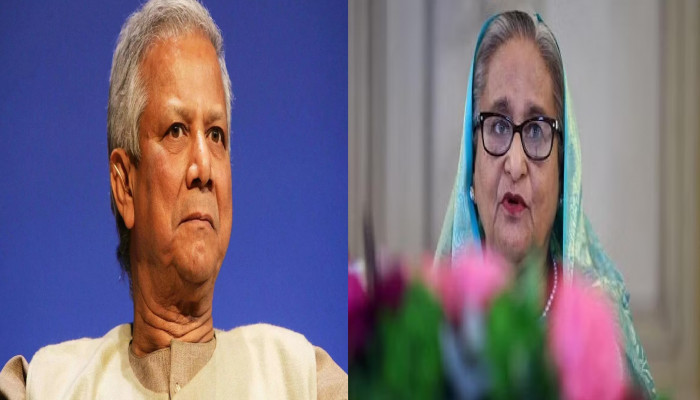‘Send her back’: Bangladesh asks India to return deposed PM Sheikh Hasina to Dhaka
- In Reports
- 06:33 PM, Dec 23, 2024
- Myind Staff
The interim government of Bangladesh announced Monday that it had written to India asking for the former and deposed Prime Minister Sheikh Hasina’s return to Dhaka.
Hasina, 77, has been living in exile in India since she left the nation on August 5 in response to the student-led demonstrations that overthrew her 16-year government. Arrest warrants for "crimes against humanity and genocide" have been issued by the International Crimes Tribunal (ICT) in Dhaka for Hasina and several of her former Cabinet members, advisors, and military and civil personnel.
“We have sent a note verbale (diplomatic message) to the Indian government saying that Bangladesh wants her back here for the judicial process,’ Foreign Affairs Adviser, or the de facto foreign minister, Touhid Hossain, informed reporters at his office. Jahangir Alam, the home advisor, stated earlier in the morning that his office had written to the foreign ministry to request the extradition of the ousted PM from India.
“We have sent a letter to the foreign ministry regarding her extradition. The process is currently underway,” he told reporters in response to a query. Alam mentioned that there is already an extradition treaty between Dhaka and New Delhi, which means Hasina could be returned to Bangladesh under this agreement.
In mid-October, Bangladesh's International Crimes Tribunal (ICT) issued arrest warrants for Hasina and 45 others, including senior leaders of the Awami League. They are accused of committing crimes against humanity during the mass student movement that led to the removal of the former prime minister. The tribunal issued the warrants after the prosecution submitted two petitions requesting their arrests. It has ordered authorities to present all 46 individuals, including Hasina, before the tribunal by November 18. Earlier in August, Bangladesh's interim government announced plans to prosecute those responsible for the deaths that occurred during protests against Hasina's government, using the ICT for the trials.
Hasina has not made an appearance in public since leaving Bangladesh. Her last known official location was a military airbase close to New Delhi. Bangladesh has cancelled her diplomatic passport, and her stay in India has strained relations between Dhaka and New Delhi. Hasina and her allies have been charged with several crimes since her removal, including murder, torture, kidnapping, genocide and crimes against humanity. She might be able to return to face these charges if India and Bangladesh sign a bilateral extradition deal. The extradition treaty between India and Bangladesh, signed in 2013, aimed to tackle cross-border insurgency and terrorism.
In 2016, it was amended to make it easier to transfer wanted individuals between the two countries. Over the years, the treaty has facilitated notable extraditions, such as the 2020 transfer of two convicts involved in the 1975 assassination of Sheikh Mujibur Rahman, Sheikh Hasina’s father, who were sent back to Bangladesh for execution. Another key case was the extradition of Anup Chetia, the general secretary of the banned United Liberation Front of Assam (ULFA), who had spent 18 years in a Dhaka prison before being handed over to India.
The treaty states that a person can be extradited if the crime they committed is punishable by at least one year in prison. It also requires "dual criminality," meaning the crime must be illegal in both countries. Since the charges against Hasina are punishable in India with serious penalties, she meets the conditions for extradition. The treaty also applies to attempts to commit crimes, as well as aiding, encouraging or helping in committing the crime. A major change in the 2016 amendment was the removal of the need for solid proof against the accused. Instead, an arrest warrant from a court in the requesting country is enough to start the extradition process, as stated in Article 10 of the treaty.
Under Article 6 of the treaty, extradition can be refused if the crime is considered "political." However, this exception is limited, as crimes like murder, terrorism-related offences, and kidnapping are clearly not considered political. Since the charges against Hasina, such as murder, enforced disappearance and torture, are not covered by this exception, India will have difficulty labelling them as political offences to deny extradition. A denial may also be made under Article 8 if the charge is not "made in good faith in the interests of justice" or relates to military offences that are not considered "an offence under general criminal law." This clause could be used by India to claim that Hasina was not charged in good faith or that she might face political persecution or an unfair trial if she returned to Bangladesh.







Comments